Rousseff faces tough economic challenges in second term
Updated: 2014-11-10 04:21
By JI YE in Rio de Janeiro and YANG YAO in Beijing(China Daily USA)
|
||||||||
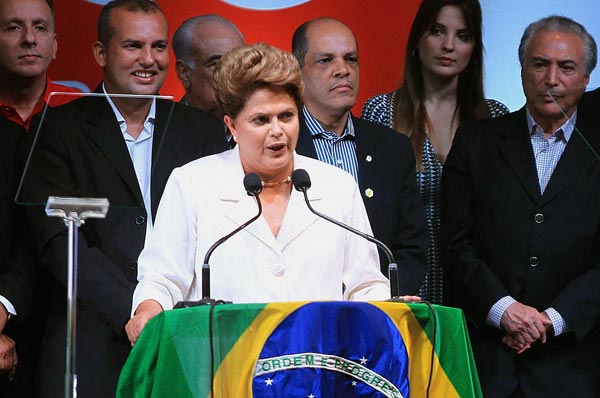 |
|
Brazil's President Dilma Rousseff addresses a rally in Brasilia on Oct 26. Rousseff was re-elected to a second four-year term on the same day. Xinhua / AGENCIA ESTADO |
Brazil's President Dilma Rousseff, narrowly re-elected to a second term, now faces keeping the vows she made in her victory speech.
"We're going to give new impetus to all sectors of the economy, especially industry," she told supporters on Oct 26. "I want a partnership with all sectors, both productive and financial, to take on the challenges ahead.
Rousseff won the runoff with 51.6 percent of the vote, while her closest rival, Aecio Neves, of the Social Democracy Party, received 48.4 percent. It was the closest presidential race in Brazil in years and believed to be the most bitterly contested one in two decades.
Xia Huasheng, a finance expert at Sao Paulo Federal University, said that the underwhelming performance of the Brazilian economy in the past four years was a major reason for the tight presidential election.
Rousseff, who became the country's first female president in 2011, and her economic team are facing severe challenges.
Since 2010, Brazil's domestic inflation rate, long a problem in a country with a history of runaway prices, has been above the government's tolerance ceiling of 6.5 percent.
Rousseff got some good news on the inflation front on Nov 7. Annual inflation decreased in October, but remained above the official target range, government data showed. Consumer prices rose 6.59 percent in the 12 months through October, easing from 6.75 percent in September. The number came in below market consensus of 6.65 percent. On a monthly basis, consumer prices rose 0.42 percent in October, compared with 0.57 percent in September. A smaller increase in food and transportation prices helped bring down inflation last month, statistics agency IBGE said.
On the same day the latest inflation figures were released, outgoing Finance Minister Guido Mantega told reporters in Sao Paulo that the government is working on a plan to reduce public spending that will include reducing subsidies to loans made by the country's development bank, according to The Wall Street Journal. He said the plan is concentrated on the spending side and indicated that no tax increases are being considered.
"We are making changes in 2014 so 2015 can start with less pressure on the economy," Mantega said, according to the newspaper.
He blamed sluggish global growth for most of Brazil's economic difficulties, the Journal reported.
In addition to inflation, according to the latest economic growth forecasts from the financial markets, Brazil's gross domestic product will register scant growth this year of 0.27 percent.
Inflation, long a problem in a country with a history of runaway prices, is above the government's tolerance ceiling of 6.5 percent.
Unemployment is near record lows, but economists don't expect it to remain so because plunging investment, slower growth and further uncertainty are expected to prompt employers to cut back.
Economists say Rousseff must pursue long-pending tax and labor reforms to increase productivity and engage further with the global marketplace.
During the presidential election, Brazilians didn't pay much attention to the candidates' policies on foreign affairs and foreign trade policy. But political observers believe that the development of closer ties with China will be a focus of the government's foreign trade policy.
Zhou Zhiwei, secretary general of the Center for Brazilian Studies at the Chinese Academy of Social Sciences, said that the way to control the inflation rate in Brazil is to increase interest rates, which restrain investment. "With this situation, it is very hard to boost its economic development within the next four years," he said.
Rousseff's social policies favoring the lower-middle classes is another restriction to feed the growing middle-income group, Zhou said.
"Social policies by Workers' Party emphasizing poverty alleviation would not match the interest of most people in the society with the burgeoning middle class people," he said.
Regarding its relation with China, Zhou said there are opportunities as well as challenges.
"One method the Brazilian government uses to boost the economy is by enlarging infrastructure investment, which is an opportunity for China," he said.
According to Zhou, China-Brazil relations are a key part of the two countries' diplomacy to promoting South-South cooperation. "Within this framework, there will be more cooperation," he said.
In July of this year, Chinese President Xi Jinping visited Brazil, boosting China-Brazil economic and trade ties. China has been Brazil's largest trade partner since 2009 and Brazil is China's ninth-largest trade partner worldwide and the largest in Latin America.
Zhou said for Brazil, cooperating with China will help meet the country's need for capital and infrastructures.
However, trade between two countries is not as rosy as before. "It is hard to see the 30 percent increase rate of trade between two countries again," he said. "Rousseff's government will export more value-added products to China due to its economic structure transition, which will create more frictions."
Leonardo Valente, professor of International Relations Faculty of the Federal University of Rio de Janeiro (UFRJ), said that Brazil recognizes that China as an important international powerhouse, and hopes not only to increase trade relations with China, but also to strengthen the strategic and political partnership with China.
"In the new term of Rousseff, Brazil and China's bilateral relations will not be confined to the fields of politics and trade, the cultural exchanges will also be further strengthened." he said.
Ronnie Lins, international affairs expert at the Getulio Vargas Foundation College also said that China will continue to be a major trade partner of Brazil.
"Brazil's infrastructure is relatively lagging behind, in which Brazil urgently needs investment from China. The infrastructure investments will further enhance trade relations between Brazil and China," Lins said.
Contact the writers at readers@chinadailyusa.com and yangyao@chinadaily.com.cn
- Brazil gets a taste of African soap opera
- Brazil has positive outlook on trade with China
- Chinese Internet companies find Brazil attractive
- Kaka to make Orlando City debut in Brazil
- China vows to further relations with Brazil
- Brazil's Rousseff urges unity, pledges reform
- Brazil reelects president Rousseff to second term
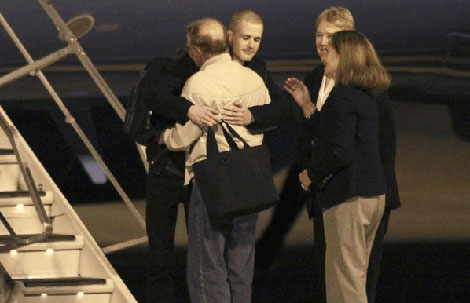
 UN chief hails DPRK's release of two US citizens
UN chief hails DPRK's release of two US citizens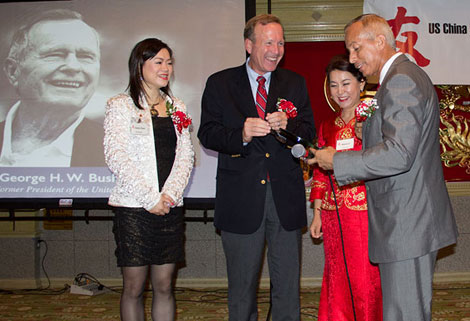
 Bush, Sun honored with Friendship Ambassador Awards
Bush, Sun honored with Friendship Ambassador Awards
 All-Chinese aerobatic team set for takeoff
All-Chinese aerobatic team set for takeoff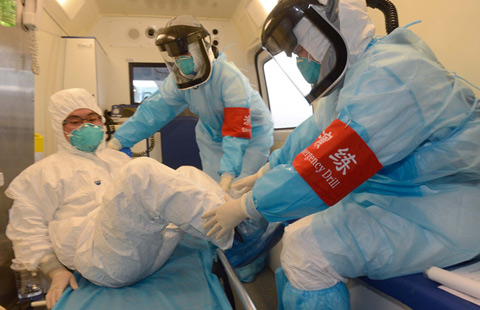
 Chengdu holds Ebola patient drill at airport
Chengdu holds Ebola patient drill at airport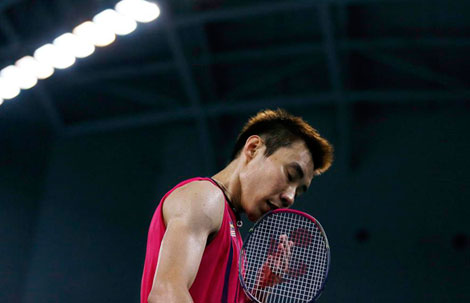
 Official: badminton world No. 1 fails dope test
Official: badminton world No. 1 fails dope test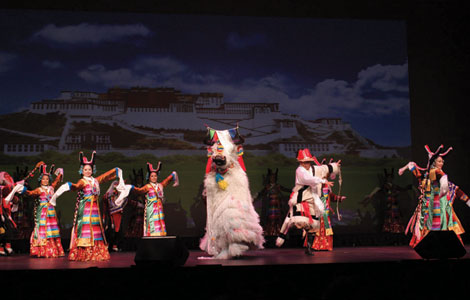
 Across Canada Nov 7
Across Canada Nov 7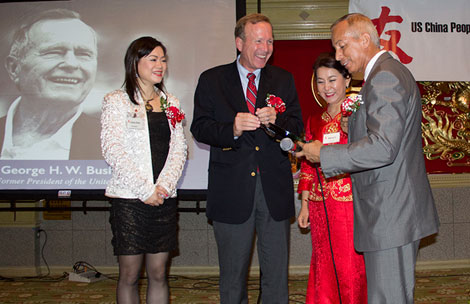
 Gala celebrates USCPFA's 40th anniversary in Houston
Gala celebrates USCPFA's 40th anniversary in Houston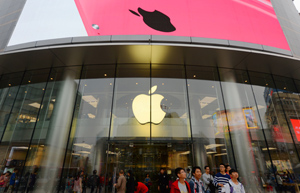
 Apple hits back at malware in China
Apple hits back at malware in China
Most Viewed
Editor's Picks

|

|

|

|

|

|
Today's Top News
UN chief hails DPRK's release of two US citizens
What's in a name? A free trip around globe
Surprise as Mexico rail contract withdrawn
UnionPay enters Suriname market
President Xi lends support for HK
BYD unveils new electric bus in Brazil
Rousseff faces tough economic challenges in second term
Japan urged to create good atmosphere
US Weekly

|

|







